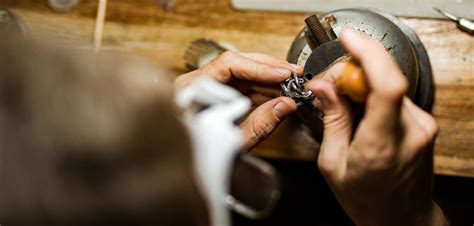Becoming A Jeweler: The Complete Guide

Are you passionate about jewelry and interested in pursuing a career as a jeweler? Becoming a jeweler requires a combination of artistic talent, technical skill, and business acumen. In this complete guide, we will explore the steps you need to take to become a successful jeweler.
1. Understand the Jewelry Industry
Before embarking on a career as a jeweler, it is important to have a solid understanding of the jewelry industry. Familiarize yourself with the different types of jewelry, design styles, and materials used. Research current trends and market demands to gain insights into consumer preferences.
2. Develop Your Skills
Like any craft, becoming a skilled jeweler requires practice and honing your skills. Consider enrolling in jewelry-making courses or attending workshops to learn various techniques such as metalworking, stone setting, and soldering. Practice regularly to improve your skills and experiment with different designs.
2.1. Metalworking
Metalworking is a fundamental skill for jewelers. Learn how to shape, solder, and polish metals such as gold, silver, and platinum. Understanding different metals’ properties will help you create durable and high-quality jewelry pieces.
2.2. Stone Setting
Stone setting involves securing gemstones or diamonds onto jewelry pieces. Learn different stone setting techniques such as prong, bezel, and pave settings. Mastering stone setting will add value and beauty to your jewelry designs.
3. Acquire Jewelry-Making Tools
To become a jeweler, you will need a set of essential jewelry-making tools. Invest in quality tools such as pliers, files, saws, and torches. These tools will enable you to create intricate and precise jewelry designs.
4. Gain Experience
Building experience is crucial in the jewelry industry. Look for apprenticeship opportunities with established jewelers or consider working in a jewelry store. Apprenticeships provide hands-on experience, mentorship, and valuable industry connections.
5. Create a Portfolio
A portfolio showcases your skills and creativity to potential clients or employers. Include high-quality photographs of your jewelry pieces, along with descriptions and any awards or recognition you have received. Having a well-curated portfolio will help you stand out in the competitive jewelry market.
6. Establish Your Brand
Establishing your own brand is essential for long-term success as a jeweler. Define your unique style and target market. Create a brand identity, including a logo, website, and social media presence. Networking and participating in industry events will help you gain exposure and build your brand reputation.
6.1. Brand Name: Sparkle & Shine Jewelry
Consider naming your jewelry brand something catchy and memorable, such as “Sparkle & Shine Jewelry”. A unique brand name will help you differentiate yourself in the market and attract customers.
7. Set Up Your Workshop
Creating a dedicated workspace is essential for jewelers. Set up a well-equipped workshop with proper lighting, storage for materials, and a comfortable workbench. Invest in tools and equipment that align with your specific jewelry-making techniques.
8. Learn Jewelry Pricing and Business Skills
Understanding jewelry pricing and business skills is crucial for running a successful jewelry business. Learn how to price your jewelry pieces to ensure profitability while remaining competitive. Familiarize yourself with inventory management, marketing, and sales techniques.
9. Market and Sell Your Jewelry
Once you have created your jewelry pieces, it’s time to market and sell them. Utilize online platforms such as Etsy or create your own e-commerce website to reach a wider audience. Participate in local craft fairs, jewelry exhibitions, and collaborate with other retailers to showcase and sell your jewelry.
10. Stay Updated on Industry Trends
The jewelry industry is constantly evolving, with new design trends and techniques emerging. Stay updated on industry trends by attending trade shows, reading industry publications, and following influential jewelry designers. Continuously expanding your knowledge and skills will ensure your jewelry remains relevant and appealing to customers.
Conclusion
Becoming a jeweler requires a combination of artistic talent, technical skill, and business acumen. By understanding the jewelry industry, developing your skills, gaining experience, and establishing your own brand, you can embark on a successful career as a jeweler. Stay updated on industry trends and continuously improve your craft to ensure long-term success in this competitive field.
Frequently Asked Questions
Q: How long does it take to become a jeweler?
A: The time it takes to become a jeweler varies depending on the individual’s dedication and the level of skill they wish to achieve. While some jewelers may start their careers after a few months of training, others may spend several years honing their craft.
Q: How much does it cost to set up a jewelry workshop?
A: The cost of setting up a jewelry workshop can vary greatly depending on the scale and equipment you require. Basic tools and equipment may cost a few hundred dollars, while a fully equipped professional workshop can cost several thousand dollars.
Q: Do I need a formal education to become a jeweler?
A: While a formal education is not always necessary to become a jeweler, it can be beneficial in terms of learning advanced techniques and gaining a deeper understanding of the industry. However, many successful jewelers are self-taught or have learned through apprenticeships and hands-on experience.
